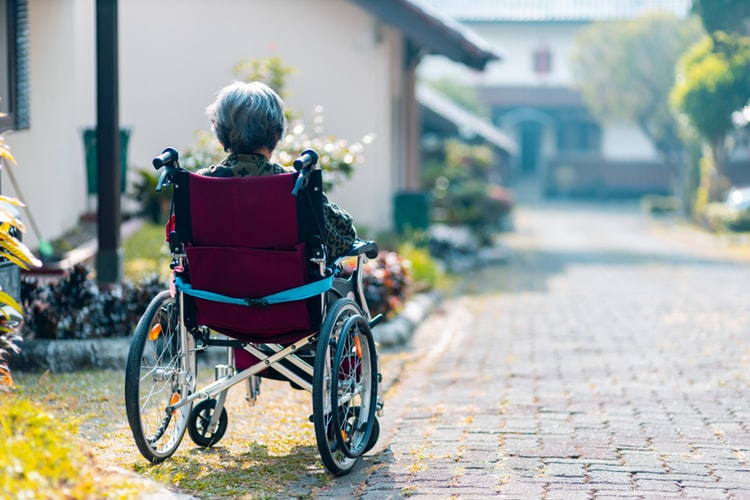
Dementia; an umbrella term used to describe a range of progressive conditions that affect the brain. With over 200 different types of dementia, it’s difficult to classify each one but the symptoms are generally very similar. It can include memory problems, a drop in cognitive ability and difficulty communicating with others. Reading and writing can become challenging, interacting with people can become difficult and you may start to become introverted.
These are all common symptoms of dementia and there are many different types that have their own unique symptoms. However, instead of taking a technical look at dementia and what it can do to the body, it’s important to be open and talk about it in a more down-to-earth way. So in this article, we’re going to take a look at what it’s like to live with dementia and how it can be coped with.
Telling people about dementia
When you first start developing signs of dementia, it can be incredibly daunting, scary and depressing. It’s not a good time for your life and even the thought of the diagnosis can become a nightmare that will continue haunting you for a long time.
However, one of the best ways to confront dementia is to learn more about it and inform others about it. When you’re prepared to tell others, sit them down and let them know what dementia means, the problems that you might encounter in the future and how people can best support you if they ask.
You might find that some people are more accepting and helpful of the revelation, but everyone has their own way of helping another person cope with dementia.
Some people will become more supportive and offer more help with everyday tasks, they might check up on you more often or they might try to interact with you on a more regular basis. Other people might not change how they act because they don’t want you to feel different and they want to continue their relationship with you regardless of what condition you have.
Just keep in mind that your friends and family members will all react differently to the reveal of your diagnosis.
Staying socially active helps a lot
One of the problems with dementia is that it can inhibit our ability to communicate with others. This is why staying in touch with others and engaging in social activities, group meetings and family dinners are incredibly important to help improve your confidence and also your mental wellbeing.
It doesn’t need to be an incredibly detailed and elaborate event either; it can just be talking to people over the phone, over the internet or having neighbors that you’re friendly with.
This is why many people with symptoms of dementia like to hire in-home carers, especially if family members and friends cannot reliably visit and plan social gatherings. An in-home carer can not only provide social interaction, but also a lot of services and general help around the house.
There are also many dementia-friendly services around the world in local communities. This can include dementia-friendly swimming lessons, support groups and general dementia support is available if needed. With so many support groups in local communities now, it’s surprisingly easy to find the right services and assistance that you need in order to stay socially active to improve your overall mental wellbeing.
Due to your dementia, you might find that you lose touch with some people because you see them less often and you don’t interact with them as much because your interests and hobbies change or decline. This can be difficult to accept but is something that you should ultimately accept as your symptoms develop.
However, there is a silver lining to this. Although you may not get involved with the same activities and people, you will form new friendships and meet new people through your activities and different support groups you attend. These people will be more understanding and accepting of your condition and will be there to help you when you’re in need of assistance.

Looking after your health when you have dementia
It’s important to look after your physical and mental health regardless if you have dementia or not. However, when you do suffer from dementia you might find that it can be more difficult to take care of your health and continue a balanced lifestyle.
The first major concern is your diet. It’s important to continue drinking plenty of clear fluids like water and consume a balanced and healthy diet that consists of all the nutrients that you need.
There are diets that could help reduce dementia risk, but these are generally focused on healthy nutrients, balanced eating and avoiding problematic foods. It’s also important to exercise on a regular basis, but this doesn’t need to be a rigorous task such as going down to the gym. Instead, your exercise could be something simple and relaxing such as daily walks, gardening, cycling or even a bit of light dancing. There are plenty of unique and simple ways to get exercise on a daily basis and your support groups should be able to help you out with this.
Getting enough sleep is also extremely important to help with your dementia. As the condition can be very stressful and tiring to deal with, you should always ensure that you get enough sleep during the night and avoid things like caffeine and alcohol because it can be a detriment to your quality of sleep.
You want to wake up feeling well-rested and you want to maintain a regular sleep schedule and routine so that you don’t spend too much time in bed. Making your home dementia-friendly can also help, such as using organizers to keep things in order and also placing reminders in easy-to-find locations to help you live a healthy and fulfilling life despite the condition.
While dementia can be troubling to deal with, there are many ways to overcome the challenges with the right mindset.















